Raft guide and researcher Maria Blevins has spent half a decade investigating sexual misconduct with the aim of making the river industry and community a safer place for everyone. Here’s what she learned about sexism, sexual harassment and sexual assault in the rafting community—and what we can do about it.
Sexism in rafting isn’t dead, yet
I arrived at the New River Gorge in West Virginia over 20 years ago to begin training as a whitewater guide. It was one of the most exhilarating times of my life. The New River in springtime had huge waves, a budding landscape and giant house-size rocks I learned to navigate a boat through. The nights were spent around a campfire with other trainees, playing bluegrass music or regaling each other with stories of an upset at Greyhound or Double Z. I fell in love with the river and the community of people I was joining.
As I was learning to navigate whitewater, I was also learning to navigate a social scene I had never encountered before. The social landscape was a little more unruly than any I had experienced. There were some wild parties, a lot of sexual energy, crass jokes and a very flexible code of conduct. That was just life on the river, it seemed.
Fast forward to 2015, when a group of 13 National Park Service (NPS) employees came forward with reports of years of sexual harassment and abuse from the river rangers at Grand Canyon National Park. The report from the Department of the Interior’s inspector general detailed accounts from female park service employees. According to the complaints, the boatmen had stuck cameras up the women’s skirts, groped them, exposed themselves and used profane language. The news stories and subsequent congressional hearing started a public conversation about sexual harassment and assault in the river community.
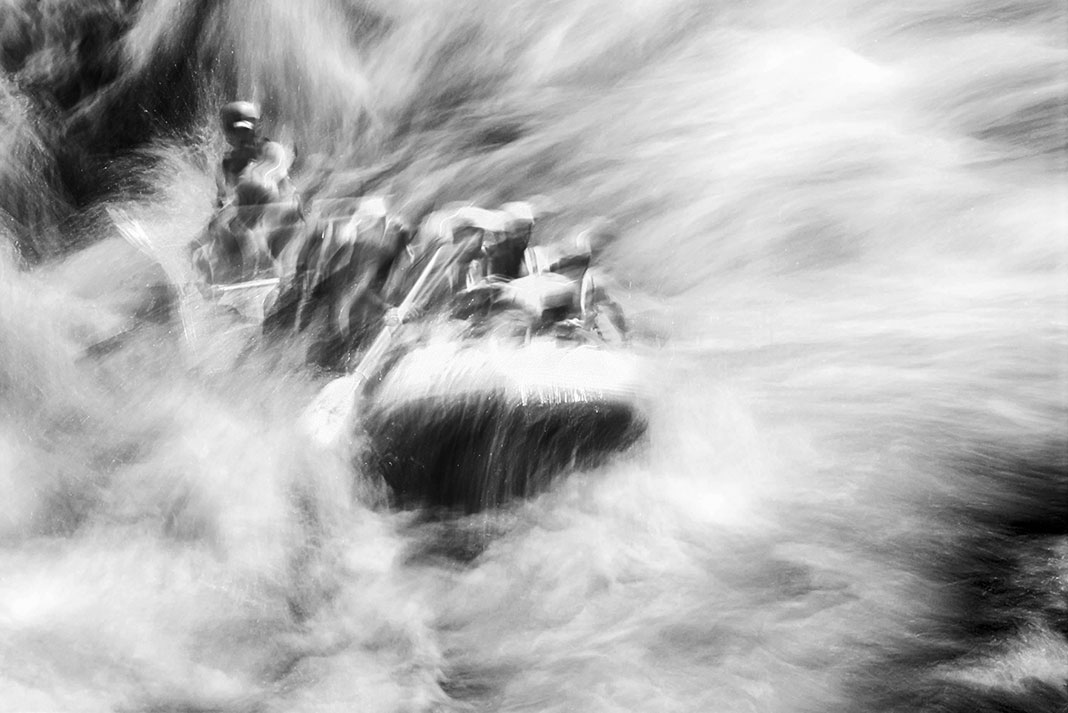
When I read the reports from the NPS, I was appalled by the behaviors described. But I was also struck by how many of the complaints were just considered part of guide life or river culture. Crass jokes, sexist language and wild conduct were so common I had not recognized the inappropriate behavior for what it was during my 12 years working as a river guide.
The NPS incident inspired my own research over the last five years into how raft guides navigate their working environments. Beginning in 2017, I interviewed 56 river guides who identified as male, female and non-binary. These guides worked on multiple rivers across the United States, including river communities in Idaho, West Virginia, the rivers of the Colorado Plateau and the Pacific Northwest. I included guides who worked day trips and multiday floats.
All but one participant acknowledged there was an expectation of inappropriate joking and questionable behavior in the river industry. Most had witnessed sexual harassment and discrimination, and a few had experienced sexual assault. The majority reported sexism was often prevalent on the river and created an environment where harassment and assault were more likely to occur.
Of course, sexism and sexual harassment are not unique to the river industry. After #MeToo, we know sexual harassment is present in every industry, even the outdoor industry. A survey of 4,176 readers by Outside magazine in 2017 found that 70 percent of respondents had been harassed in the outdoors or while working outdoors. In 2018, the organization #safeoutside conducted a survey of 5,311 climbers and found half of women and one-sixth of men had experienced harassment or assault in the climbing community.
The river community is not alone in needing change.
However, some aspects of the job of a river guide make sexual harassment both more prevalent and harder to navigate.
The U.S. Equal Opportunity Employment Commission outlines work environments with younger workforces, larger power differentials between employees, customer service-based work, and the prevalence of drugs and alcohol as more likely to be workplaces where harassment occurs. Additionally, the blurry line between work and home, the physical isolation of river trips, and the fact that human resources is difficult to contact from the bottom of a canyon make identifying and reporting harassment more complicated. Many small river companies don’t have HR departments and historically many have not spent a lot of time training staff in anti-harassment protocols. The line between friend and manager can get hazy on the river, and employees do not want to be perceived to be “difficult” or “hard to work with” by reporting inappropriate behavior. Additionally, raft guiding is still a male dominated profession. Many participants reported the supervisors whom they would report to were men, or even men they perceived as harassers.
The women expressed they valued being part of the river community so much they were hesitant to report the assault because they worried about being ostracized.
The study I conducted is qualitative, which means I interviewed people about their experiences. When one person comes forward to talk about how tough it is to fit in as a female rafting guide or kayaker, it can be dismissed. But when every respondent has similar stories, themes emerge. Through my research, I’ve found these are the four common ways sexism and sexual harassment show up in the river community today.
Who’s laughing now?
Most participants highlighted the fun work environment as one of the reasons they loved working in the rafting industry. However, participants also observed humor used as a veiled way to gatekeep who belongs in the river community through jokes about gender, race and body type. Inappropriate jokes were used as a way to talk about sexual acts or women’s bodies. Then there’s the genre of jokes about female raft guides.
Female raft jokes ranged from the benign: “What is the difference between a catfish and a female raft guide? One has whiskers and wallows in the river and the other is a fish.” To the toxic: “What’s the difference between a female raft guide and a laundry machine? A laundry machine doesn’t follow you around all summer after you drop a load in it.”
To be clear, I have told my share of female raft guide jokes. But I think it’s worth examining why we think they’re funny. I gathered all the jokes I could find about female raft guides—18 in total—and coded them into four themes. The jokes portray women as unfeminine, unclean, undesirable sexual partners or sexually promiscuous. It highlights the difficulty of being both a raft guide and exhibiting the traditional values of femininity, which include chastity, beauty and cleanliness.
I found eight jokes that refer simply to raft guides and could serve for any gender. For example, “What do a raft guide and a medium pizza have in common? Neither can feed a family of four.” None of the non-gendered jokes demeaned their subject in the way some of the female-specific jokes did. Participants reported that when they called out inappropriate jokes, they were most often told, “It’s just a joke, don’t be so sensitive.”
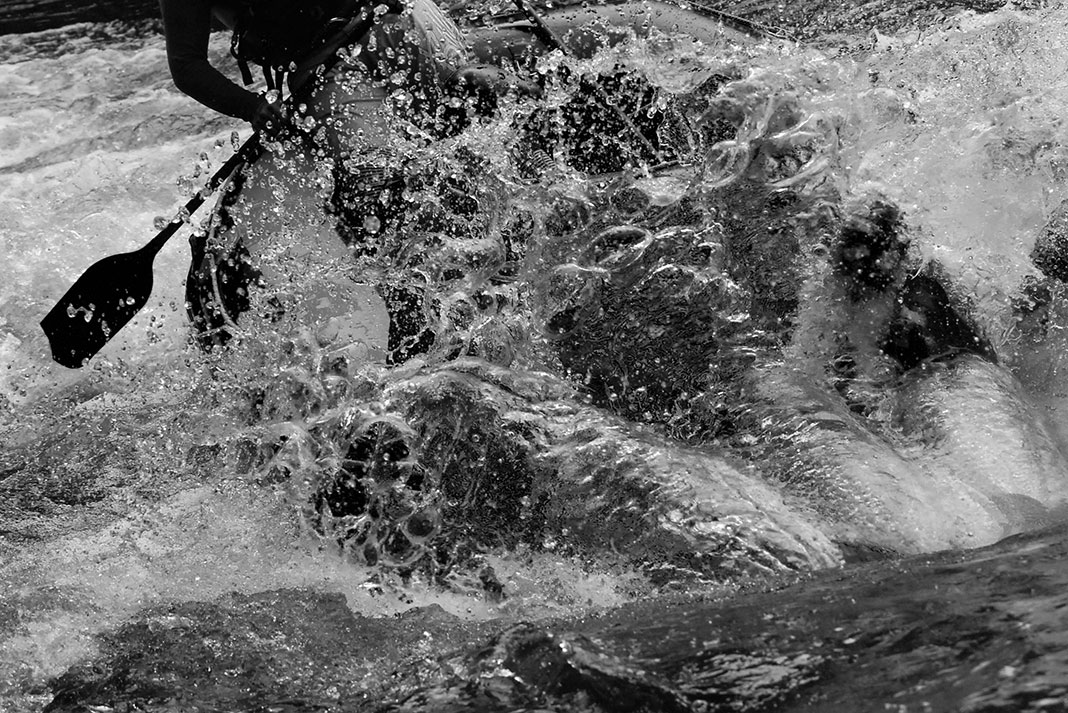
Party culture
The culture of whitewater is often associated with drinking, raucous behavior and drugs. Participants pointed out this environment allowed for actions that would be unacceptable anywhere else because it was part of the so-called fun, like grabbing people’s butts, naked noodle wrestling at work and getting colleagues’ attention by tapping a genital piercing against a beer bottle.
“I mean, we’re river guides, we’re allowed to be gross and crass and say f***ed up things,” said John, who has guided for more than 20 years on daily and multiday trips all over the Western United States. “Boatmen are foul-mouthed f***ing s***bags, and so you’re allowed to just let that fly.”
Assault
Multiple women I talked to had stories of being inappropriately watched or sexually assaulted in the river community. Many women had caught men watching them pee in the river or using the groover. Almost every female participant had a story of a man entering her sleeping space at night—men crawled into tents, into the back of trucks or lay down next to them while they slept without consent. Some of these men took it further and kissed the sleeping women or touched their breasts or genitals. Five of the 36 women interviewed were sexually assaulted by a man in their river community. The women expressed they valued being part of the river community so much they were hesitant to report the assault because they worried about being ostracized.
Dawson, who guided on a class V river for eight years and now works training outdoor guides, recalled a woman who reported her harassment, “And that person was never the same in the industry. They were retaliated against.”
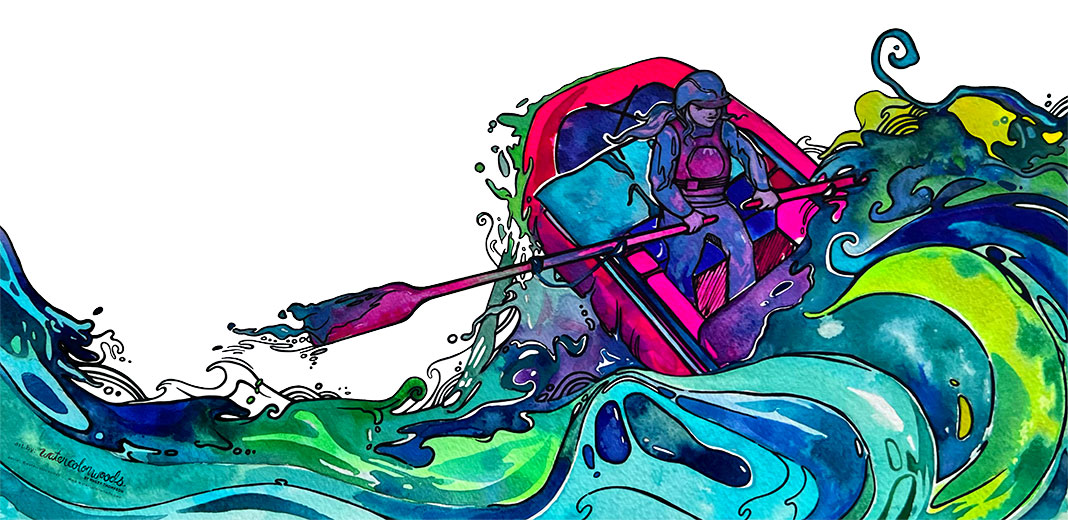
Undermining
Through the interviews, the theme that stuck out most was how women felt they had to constantly prove themselves to be worthy of being on the river. Women felt they had to convince customers they were as qualified as male guides and prove themselves to coworkers more than their male counterparts did.
5 Ds of bystander intervention
Bystander intervention offers five techniques you can use when you see someone who might need support to get away from someone harassing them.
D1: DISTRACT
Jump in with a comment or joke to stop the harassing behavior.
D2: DELEGATE
Find more people or someone in a more senior position who can help interrupt the behavior.
D3: DIRECTLY ADDRESS
Address the person harassing and point out the behavior is inappropriate.
D4: DELAY
If you can’t do anything at the moment, check in afterward to see if the person who was targeted needs any support.
D5: DOCUMENT
Write down what you see; it might be useful later to have a record of the incident.
Olivia has raft guided all over the world for more than 20 years. “Especially if you were working on a challenging river, there was oftentimes a sense of disappointment from men if they got a female guide,” she said. “They felt they were perhaps going to have less of a trip. Because obviously a woman couldn’t get them down the river in the same way as a man. Some men would refuse to go down the river with a female guide.”
Research participants did not feel they had opportunity to make the same mistakes as male colleagues. “I basically just felt the need to always be really good at what I did. To never be last because I didn’t want any assumptions to be made on my ability to do the job based on my gender,” said Nancy, who has guided multiday river trips in the intermountain west for six years. “There wasn’t really any sort of fading into the crowd.”
Another common way sexism showed up in my interviews was through beta spraying. The term comes from the climbing community and describes when someone gives advice about a climb or techniques without being asked. Multiple participants had stories of men interrupting women while giving information scouting.
Looking downriver
Despite the sometimes grim stories I heard during my research, I am optimistic. Boaters are the perfect outdoor group of people to lead the change and make the river community more welcoming and safe for everyone. Most paddlers are eager to welcome people to the sport and already look out for each other on the river. Strangers set safety for each other in rapids, help get strangers’ boats unstuck, and I have seen everybody available jump on a Z-drag to get someone out of danger. Whitewater paddlers know how to watch out for each other’s physical safety. I believe we can watch out for each other in a new way, making sure no one is being harassed or assaulted.
Whenever I explain my research, people enthusiastically proclaim, “It is about time, the river scene is ready for a change.” And I have seen evidence change is happening. Rafting companies are hiring river specific sexual harassment trainers like Emily Ambrose from Engage Coaching and Consulting, Jim Miller and Gina McClard from Respect Outside and Myra Strand from Strand Squared. These individuals offer training that recognizes the special needs of the outdoor community.
“Stopping unwelcome behavior is everyone’s responsibility and starts from the top down, with commitment by the organization’s leaders to create real culture change,” said Jim Miller, who’s also a co-founder of The Anti-Discrimination and Sexual Harassment Collaborative (A-DASH). This is a group of trainers, outfitters, guides, governmental agencies and academics who have created tools to help decrease sexual harassment in the river community. This group uses my research to help inform the training and information they provide.
Since the idea for its formation took root at the 2019 American Outdoors Association conference, A-DASH has conducted training for raft companies all over the U.S. and the National Park Service. The group has also presented at the American Outdoor Association Conference, The National Wilderness Skills Institute, and the Association of Outdoor Recreation and Education Diversity Summit. “Learning to interrupt unwelcome behaviors is the cornerstone of our training. You can learn to read the situation like you’d read a rapid. This will help you contribute to diminishing sexual misconduct and discrimination in your river community,” added Miller.
Maria Blevins’ love affair with the river continues to this day. After guiding for 12 seasons, she still boats with the same group she trained with. She is now an associate professor of communication with a PhD. in organizational communication and a whitewater hobbyist. Names have been changed to protect the identity of research participants.
Feature illustration: Hailey Thompson

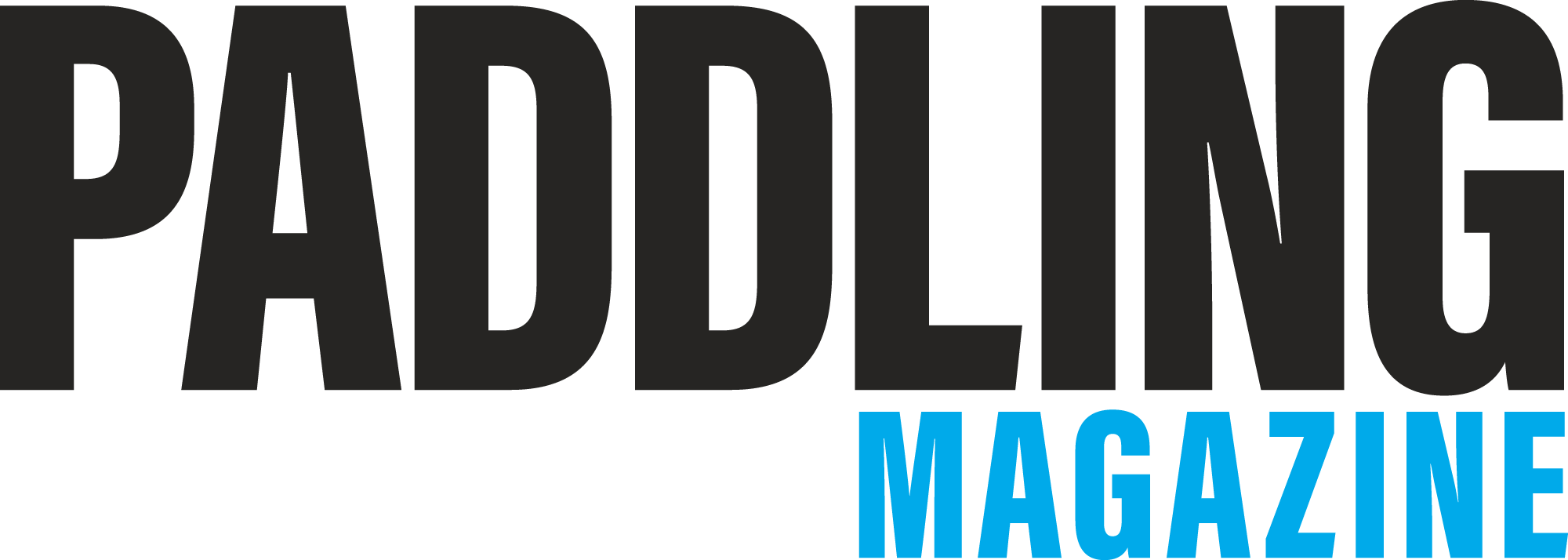

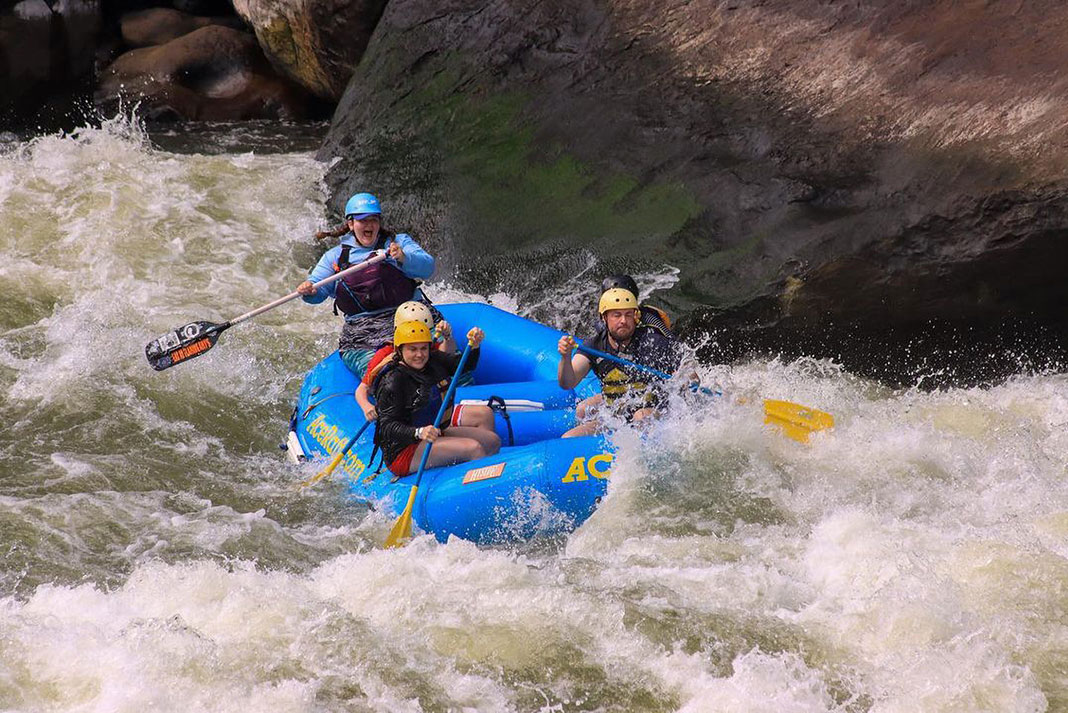
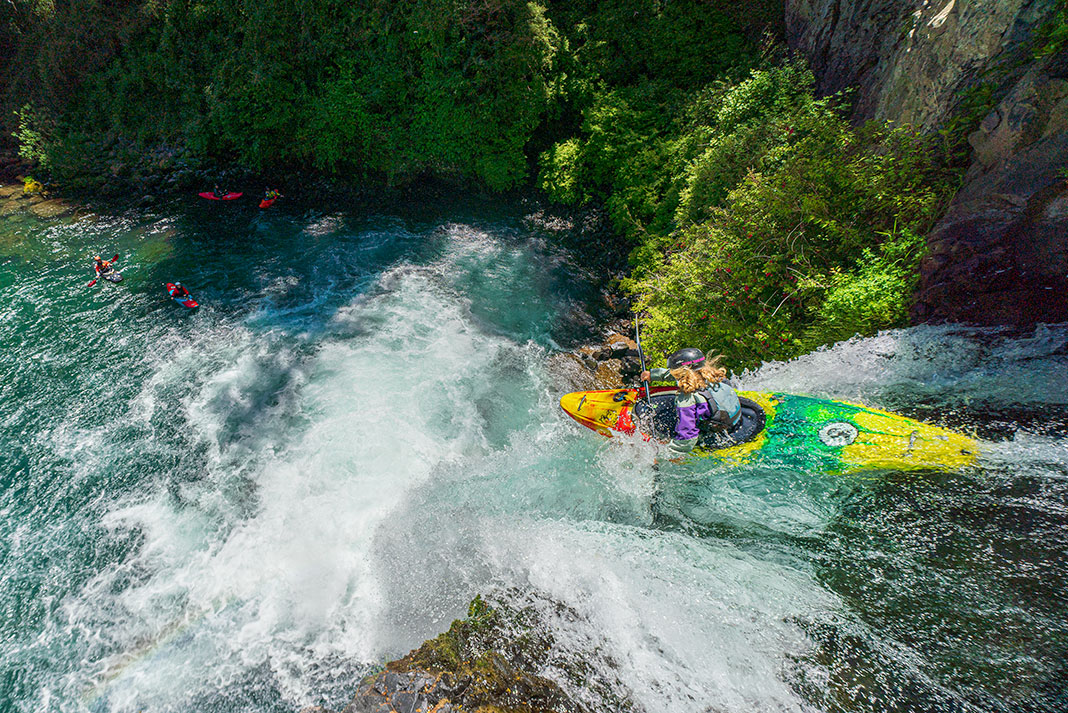
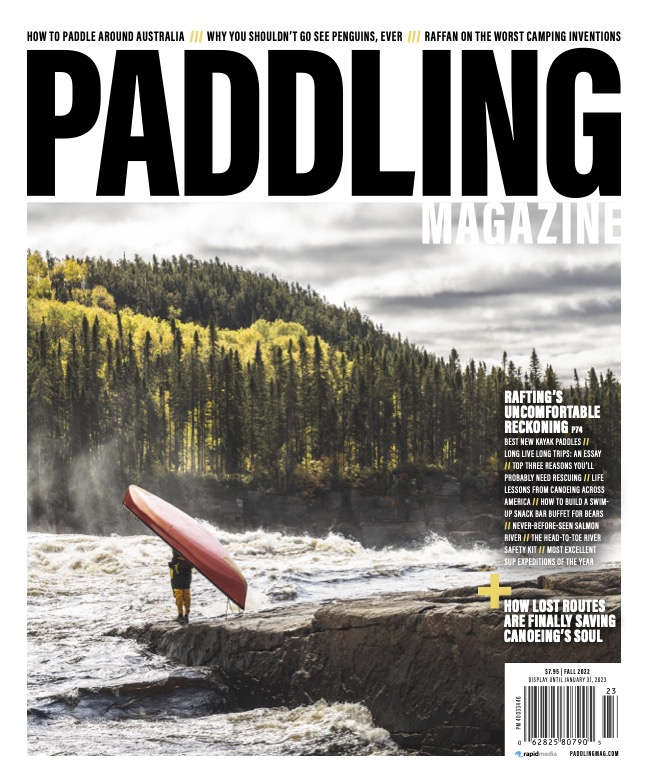 This article was first published in the Fall 2022 issue of Paddling Magazine.
This article was first published in the Fall 2022 issue of Paddling Magazine. 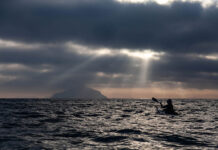
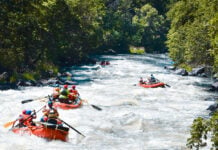
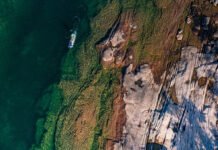
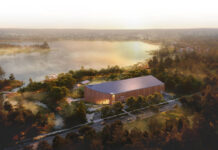
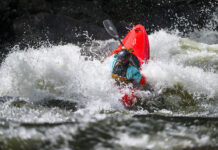

This is spot on. All I have to say is after spending over half my life working in this industry and experiencing many of the things written about in this article. I am glad there is now a time where these issues can be resolved. The rafting industry is behind the times as far as being able to look at these issues. Other entities including the Military have at least made efforts to acknowledge these problems and provide training for staff and therapy for those affected by sexual trauma. There are also policies mandating drug testing. I am not sure why the whitewater industry is behind the times here.
Sexism is something that is perpetuated by the of the Party Crowd. People who live the Bohemian Life Phylosophy Irresponsible, all about the Me, What Me wants, My happiness etcetera… Some or most in the boating community will disagree. But usually because it runs a nerve. Coupled with drug use and irresponsible drinking. And what do you expect? This will never change. Until folks start taking responsibility for their actions. Find some sort of self respect. And then they can have the clarity of mind to respect others. It’s an ancient saying. ( Do into others, as you would have them do to you).
You can scream all day about Men vs Women bull. But that only makes things worse. Until the real issue is addressed.
Wow, who knew? Personally, after intentionally getting into paddlesport 50+ years ago for fitness, nature and competition, I really took a different view of rafting companies who encouraged hordes of inexperienced people to make a beautiful whitewater run into a floating party. I really thought they were just virtuous revelers. and it was someone else crapping along the shorelines, cranking up boom boxes, and leaving behind empties and graffiti. But I missed out on all the victimization since: (a) I’ve never gotten into a raft, preferring instead my own canoe or kayak, and (b) never wanted to work with summer furloughed teachers, righteous liberal arts majors, and self-appointed “extreme” sports experts. I just wasn’t professional enough to make paddling my job, so I kept another and used paddling as an escape. But it now appears Edward Abbey was sexist after all. No wonder the modern Park Service hated him. Please edit or burn all his books.
The higher u go up the ” chain ” so to speak Professionalism wise – u often get better people – when people – like the author admits – get drunk or high 24
/7 and act like idiots – well what do u expect ?
The assumption that the issue of sexual harassment and assault is only a women’s issue is a bit one sided. Men also can and have experienced these issues.
The bottom line is the whitewater industry overall needs to be more diligent at eliminating this issue. No other professional workplace allows this type of behavior to continue without recourse.
EO officers exist, education is done to inform workers regarding appropriate workplace conduct occurs, a mode of reporting exists and incidents are investigated and people typically are fired.
This is standard operating procedure. This does not happen ever in the whitewater industry despite rampant cases. More effort is made to sweep incidents under the rug and threaten those who report issues than to rectify the problems.
Everyone, in the whitewater industry seems to desire to be viewed as a credible paddler but few desire to be viewed for their integrity on other fronts.
The organizations that govern the sport which expect dues from membership do nothing more than put out an occasional publication with a false image of DEI. It does not matter how many of what type people are on the poster with the rad dad kayaker of the moment. That does not bring about inclusion just a false image of such. The thing that makes people desire to retain in a workplace and in an activity overall is the climate.
To be honest I am a bit shocked that more female paddlers in clearly visible positions in the sport have not aggressively made efforts to speak out on this problem. It is one thing to win a medal in an obscure sport and have a few people clap for five minutes and it is quite another to do what is required to make the needed changes. No one desires to truly take a stand on these issues because they don’t want to upset their sponsors etc.
My thoughts are these: there is no paddle sport product that exists that is so great if the overall industry that the product is made for has these types of problems. Instead of telling me how many loops, how big the waterfall is the boat runs, what color pink the paddling jacket is etc show me by taking an industry wide stand against the issue of sexual harassment and assault.
The industry has spent decades either displaying women as cute swimsuit model types and not truly showing women as the capable individuals they are.
However, this is not just a polarized gender issue. Sexual assault and harassment don’t belong in any environment.
In any case I personally won’t deal with the whitewater industry again until I see real change. No where have I really seen to be a suitable workplace for the required effort.
In environments where one has to accept similar risk and become appropriately trained and experienced to perform the job effectively more respect exists for women and people overall. Ineffective pay, insufficient drug testing protocol the entire situation makes for the dumpster fire that exists.
The whitewater industry is more or less a frat party. Quite frankly I am glad to see this article written. I hope more will follow and change will occur.
After, reading many of the opinions regarding sexual assault and harassment just being a women’s issue; I wonder if the same commentary would exist if more men actually were willing to disclose these issues.
It is a misnomer that this is a gender polarized issue. The fact that sexual harassment and assault are presented as just problems that affect women in the workplace is incorrect.
The attitude that this is to be expected in an environment where women do not belong is the standard comment. Oh the women are just whining etc etc etc.
The reality is that a culture that breeds sexual harassment and subsequent assault of anyone is unacceptable.
There is no excuse. I find it very odd that people who have the courage to run waterfalls and preform other feats don’t have the courage to disclose when something inappropriate occurs.
This is likely due to the fact that these problems are so embedded into the fabric of the sport and industry overall that people have become immune and accepted them.
The reality is that for most whitewater professionals working on the river is often a first job and a first time away from home. Most people in the sport are quite young and elder people in the sport often lack both morality and integrity to treat those who are coming to the sport/industry at a young age in a fashion that is appropriate.
I think overall the people that work in this industry and call themselves leaders need to check themselves.
I have personally experienced quite a lot of inappropriate conduct. The behaviors that have been accepted and condoned in the river workplace do not in any way constitute professional behavior.
Making efforts to address these concerns only serves to threats, intimidation and an overall effort to sweep incidents under the rug.